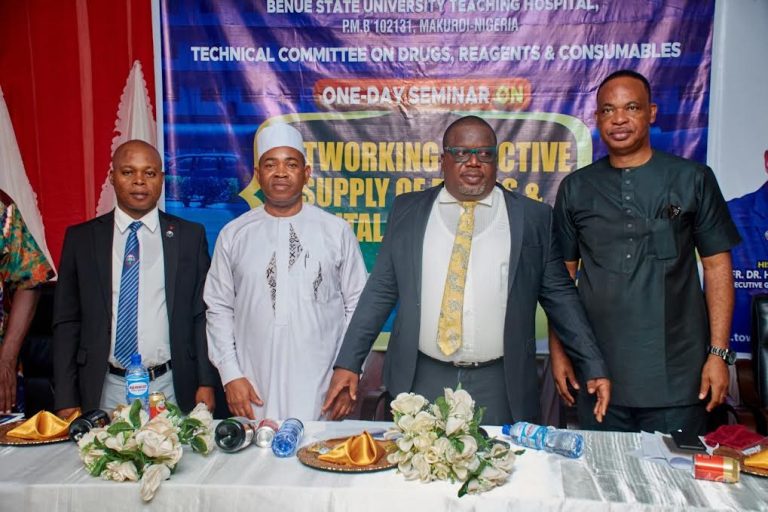By Doris Obinna
The Benue State University Teaching Hospital (BSUTH) is set to become a centre of medical excellence and a drug distribution hub in the country.
The Executive Governor of Benue State, Rev Fr Hyacinth Alia, recently approved the construction of an ultra-modern and digitised medical store, which is almost completed in readiness for the institutionalisation of an efficient supply chain management system for medicines, reagents, consumables, and hospital equipment.
The Chief Medical Director (CMD) of BSUTH, Dr Stephen Hwande, disclosed this at a stakeholders’ consultative meeting and sensitisation seminar held on Thursday in Makurdi.
Hwande stated that BSUTH, under his leadership, is determined to change the negative narrative of the “out-of-stock syndrome” and ensure the complete revamping of the supply chain for drugs, consumables, and hospital equipment.
He further emphasised his commitment to reversing the unwholesome tradition of BSUTH waiting endlessly for essential and life-saving medicines and consumables from Lagos, Abuja, and Onitsha, often to the detriment of patients in critical conditions.
“The current efforts of BSUTH management to revitalise the inefficient drug and consumable supplies align with the governor’s transformation agenda for the health sector.
“Governor Alia has made significant investments in a qualitative healthcare delivery system, committing 15 per cent of Benue State’s annual budget to the health sector. He must be commended for complying with the World Health Organisation’s (WHO) requirement.
“We want to replicate the efficient hospital drug supply systems in Lagos and Abuja here in Makurdi. This is not about drug retailing but about making BSUTH a centre of excellence in medical diagnosis and treatment, as well as in the supply of life-saving medicines.”
The CMD called on all regulatory agencies, drug manufacturers, and importers present at the seminar to support BSUTH in achieving this laudable initiative.
In a keynote address delivered by a retired Director of Public Affairs at the National Agency for Food and Drug Administration and Control (NAFDAC), Dr Jimoh identified inefficient supply chain infrastructure, limited access to essential medicines, falsified and substandard drugs, and inadequate supply chain visibility as some of the challenges faced by health institutions in ensuring effective and sustainable supply and distribution of medicines and hospital consumables.
Dr Jimoh, who is also an adjunct Senior Research Fellow at the University of Abuja, listed the adoption of digital technologies, stakeholder collaboration, an efficient procurement system, and capacity building for staff as key strategies BSUTH must embrace to achieve its objectives of establishing effective and sustainable supply chain management.
He praised the efforts and vision of the CMD, noting that the new initiative would reduce patronage of open drug markets and enhance access to safe, high-quality, affordable, and efficacious medicines and hospital consumables for the people of the state.
Earlier, the Chairman of the Medical Advisory Council, BSUTH, Prof Michael Agbir, presented an inventory of the drugs and consumables needed by the hospital to tackle the perennial out-of-stock syndrome.
Prof Agbir reiterated the BSUTH management’s determination to work closely with all stakeholders in the pharmaceutical industry to realise its objectives and ensure the state is not left behind in the healthcare sector.
